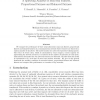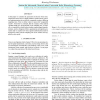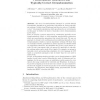2735 search results - page 230 / 547 » Comparing notions of randomness |
116
Voted
QUESTA
2006
15 years 28 days ago
2006
We compare the performance of three usual allocations (max-min fairness, proportional fairness and balanced fairness) in a communication network whose resources are shared by a ra...
109
click to vote
ACL
2009
14 years 10 months ago
2009
While Active Learning (AL) has already been shown to markedly reduce the annotation efforts for many sequence labeling tasks compared to random selection, AL remains unconcerned a...
111
Voted
CORR
2011
Springer
14 years 8 months ago
2011
Springer
In this paper we consider the generation of discrete white noise. Despite this seems to be a simple problem, common noise generator implementations do not deliver comparable resul...
100
click to vote
APPROX
2009
Springer
15 years 7 months ago
2009
Springer
The area of derandomization attempts to provide efficient deterministic simulations of randomized algorithms in various algorithmic settings. Goldreich and Wigderson introduced a n...
121
Voted
FOCS
2008
IEEE
15 years 7 months ago
2008
IEEE
Learning problems form an important category of computational tasks that generalizes many of the computations researchers apply to large real-life data sets. We ask: what concept ...



